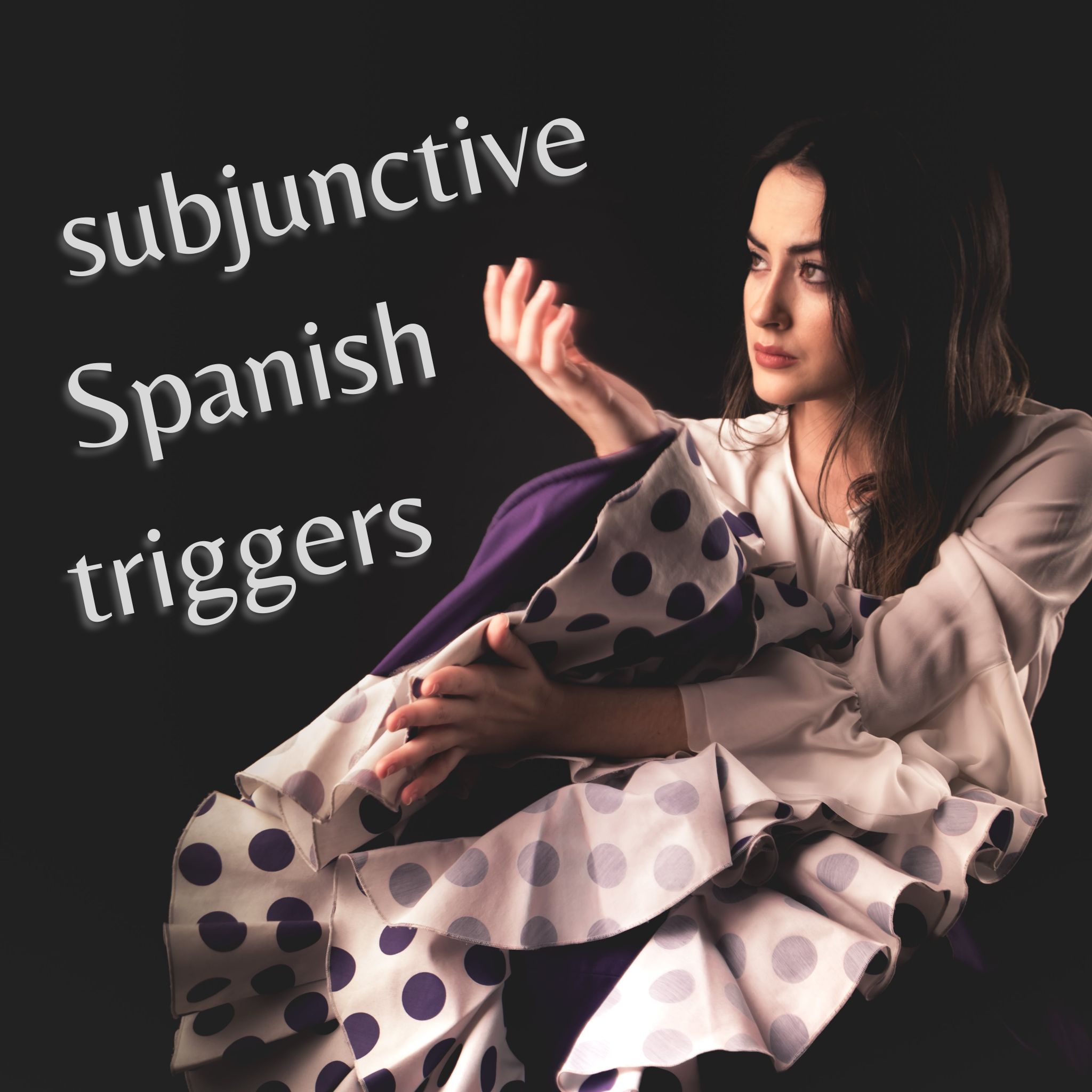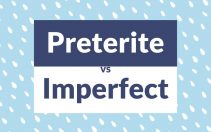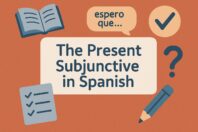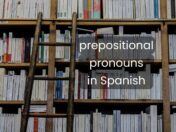Subjunctive Spanish Triggers: Know when to use the subjunctive

Get our free email course, Shortcut to Conversational.
Have conversations faster, understand people when they speak fast, and other tested tips to learn faster.
More infoIf you’re reading this article it’s probably because you’ve already been studying the Spanish subjunctive mood for a while. By now, we can imagine that you’re finding this topic fairly challenging. But relax, because today we’re here to share a set of subjunctive Spanish trigger words that will make using this mood so much easier.
In today’s post, we’ll provide you with a handy list of subjunctive trigger words and phrases in Spanish, all accompanied by numerous examples for you to understand how to recognize them and when to use them. Once you know these, you’ll be well on your way to knowing many of the contexts when you should use the subjunctive mood in Spanish.
We’ll look at each Spanish subjunctive trigger individually in the following sections, and we’ll provide lists of them all in the conclusion for easy reference. So without further ado, let’s dive into the world of subjunctive Spanish trigger phrases!
What are subjunctive triggers in Spanish?
A trigger is a word or a set of words that calls for using the subjunctive mood in the next clause. In other words, the trigger is the word or phrase that forces the next verb in the sentence to be conjugated in the subjunctive mood.
To put it simply, whenever you come across any of the Spanish subjunctive triggers we’ll be looking at here, where there’s a clear intention of the speaker to express a wish, an emotion, a hypothesis, or an uncertainty, you’ll need to use the subjunctive mood next.
Grammar: Dependent clauses
We need to keep in mind that most sentences are made up of two or more clauses. While clauses can sometimes stand on their own, in many cases they work together to express the overall intent of the sentence. Any clause that relies on another to make sense in the sentence is considered a dependent clause, also known as a subordinate clause.
The subjunctive mood relies on an initial clause to trigger its use. Typically, this first clause introduces a hypothetical aspect, a desire, an emotion, a wish, or some uncertainty. Most subjunctive clauses are subordinate, meaning they are dependent on the initial clause to exist in the subjunctive mood. These clauses are generally linked by the conjunction que. Let’s see this with an example:
- Dudo que María venga a la fiesta. – I doubt that María will come to the party.
Here, Dudo que acts as the trigger, and venga is the verb of the dependent clause conjugated in the subjunctive.
Now that we know where to find the words or phrases that trigger the subjunctive, let’s move on to the trigger words themselves.
Trigger words for subjunctive
In this section, we present you with single words that function as subjunctive triggers in Spanish. Some of them are used to express doubt, such as quizá or tal vez, while others are used to talk about wishes, possibilities, or hypotheses.
We’ll highlight our subjunctive trigger words in bold, with the resulting subjunctive conjugations in italics.
Quizá, Quizás
Maybe
- No estamos seguros, pero quizá ellos sepan la respuesta. – We’re not sure but maybe they know the answer.
Tal vez
Perhaps
- Tal vez esta sea la mejor solución. – Perhaps this is the best solution.
Ojalá
I wish, I hope, If only
- Ojalá podamos vernos pronto. Te extraño. – I sure hope we may see each other soon. I miss you.
For a full lesson on this term, check out our dedicated post on expressing wishes with ojalá.
Probablemente
Probably
- No hay nadie en el salón. Probablemente no haya clases hoy. – There’s no one in the classroom. Probably there are no classes today.
Posiblemente
Possibly
- El tren posiblemente llegue a las 5:30 de la tarde. – The train will possibly arrive at 5:30pm.
Cuando
When
- Avísame cuando estés listo. – Tell me when you’re ready.
Note that we use cuando + subjunctive when we are referring to a future event or a hypothetical event.
Aunque
Although, Even though
- Aunque no digas nada, yo sé que me extrañas. – Although you don’t say anything, I know you miss me.
Trigger words for subjunctive Spanish: Verb + que
Now we’ll see some verbs we normally use to express wishes, desires, doubts, emotions, recommendations, and more, all of which are followed by the conjunction que to trigger the Spanish subjunctive in the next clause.
Verbs to express desires, wishes, and advice
When native speakers want to express a wish or a desire, or give some advice, they use the verbs we’ll see in these examples. The construction is verb + que + subjunctive.
- Nos aconsejaron que no viéramos esa película de terror. – They advised us not to watch that horror movie.
- El maestro necesita que no hablen ahora. – The teacher needs you to not speak now.
- El doctor prefiere que no fumes. – The doctor prefers that you don’t smoke.
- Gastón espera que su equipo gane el partido. – Gastón hopes that his team wins the game.
- El jefe le pidió a César que no llegara tarde nunca más. – The boss asked Cesar to never arrive late again.
- ¡Todos te deseamos que tengas unas felices vacaciones! – We all wish you to have a happy vacation!
- Carlos había sugerido que primero leyéramos el manual del usuario. – Carlos had suggested to us that we first read the user manual.
- Su padre le prohibió que salieran de la casa a la noche. – His father forbade them from leaving the house at night.
- Solo nos permiten que miremos el celular en el recreo. – They only allow us to look at our cell phones during recess.
- Su esposa siempre quiso que Juan fuera más responsable. – Juan’s wife always wanted him to be more responsible.
- Los veterinarios siempre recomiendan que los perros vivan al aire libre. – The vets always recommend that dogs live outdoors.
- Los niños nos rogarán que los llevemos al parque. – The kids will beg us to take them to the park.
Verbs to express emotions and feelings
Let’s dive into a more emotive world. Whenever we need to express feelings, whether positive or negative, we can use the verbs we’ll see in these next examples. Just remember to add que after the emotion-expressing verb and then conjugate the dependent clause’s verb in the subjunctive.
- A Cris le molesta que no lo escuchen cuando habla. – Cris is bothered when they don’t listen to him.
- No me sorprende que haya venido tanta gente a la fiesta. Nos divertimos mucho siempre. – I’m not surprised that so many people have come to the party. We always have so much fun.
- Nos preocupa que no quieras ir a la Universidad. – We’re worried that you don’t want to go to university.
- Siento mucho que no puedas venir a nuestra boda. – I’m so sorry that you can’t come to our wedding.
- A Sergio le encanta que cantes tan bien. – Sergio loves that you sing so well.
- Al presidente le interesa que los funcionarios trabajen juntos. – The president is interested in the fact that the officials work together.
- Me alegra que hayas resuelto tu problema. – I’m glad that you solved your problem.
Verbs to express doubt, assumptions, and negative belief
Now we present some examples of the most common subjunctive triggers in Spanish used to express doubt, such as Dudo que – I doubt, a hypotheses, such as Supongamos que – Let’s suppose, or disbelief, such as No creo que – I don’t think.
- Dudamos que esos relojes sean originales. – We doubt those watches are original.
- La chica no cree que su hermano haya ganado el premio. – The girl doesn’t think her brother had won the prize.
- No pienso que sea cierto lo que dice el candidato a presidente. – I don’t think that what the presidential candidate is saying is true.
- La profesora no considera que el examen esté mal. – The teacher doesn’t consider the test to be bad.
- Supongamos que tu novia quiera ir de compras. ¿Tienes suficiente dinero? – Let’s suppose your girlfriend wants to go shopping. Do you have enough money?
Note that creer, pensar, and considerar are only used in the subjunctive in Spanish in the negative form. Affirmative sentences using those verbs should be conjugated in the indicative mood.
Suponer can also be used in some other situations where the subjunctive is not necessary. For a full lesson on these nuances, check out our dedicated post on how to use supongo when making assumptions.
Subjunctive trigger phrases in Spanish: Es + adjective + que
In this section, we’ll devote our time to some structures that are a bit more complicated. These phrases are impersonal, which means that the performer of the action is not mentioned. In this construction, the ser + adjective + que subjunctive trigger phrases function to give opinions, express emotions, state obligations, and express possibilities.
Subjunctive trigger phrases to express emotions and opinions
- Es difícil que Julieta tenga tiempo para jugar. – It’s difficult for Julieta to have time to play.
- Es terrible que los ciudadanos no hayan podido votar. – It’s terrible the citizens couldn’t have voted.
- Es extraño que no hayan visto tu mensaje. – It’s weird they hadn’t seen your message.
- Es sorprendente que haya tanta gente en un lugar tan pequeño. – It’s surprising that there are so many people in such a small place.
- Es increíble que un niño de 2 años sepa hablar tan bien. – It’s incredible that a 2-year-old boy knows how to speak so well.
- Es ridículo que todavía creas en Santa. – It’s ridiculous that you still believe in Santa.
- Es natural que los hermanos tengan peleas. – It’s natural that siblings have fights.
- Es mejor que el trabajo esté listo esta semana. – It’s better that the assignment be ready for this week.
- Es interesante que podamos hablar sobre nuestros proyectos.- It’s interesting that we can talk about our projects.
- Es bueno que vean al doctor una vez al año. – It’s good that they see the doctor once a year.
- Es malo que comas comida chatarra constantemente. – It’s bad for you to eat junk food constantly.
Subjunctive trigger phrases to express obligation and possibility
The following set of examples also contains impersonal structures like the previous section. These subjunctive trigger phrases are normally used to express obligation and possibility with adjectives such as importante, necesario, or posible.
- Es importante que sepamos qué hacer en una emergencia. – It’s important to know what to do in an emergency.
- Es necesario que ajustes el cinturón de seguridad. – It’s necessary that you fasten your seatbelt.
- Es urgente que le informes a tu jefe sobre este inconveniente. – It’s urgent for you to inform your boss about this issue.
- Es posible que haya más de 10 personas en la sala, pero no lo sabemos con certeza. – It’s possible that there may be more than 10 people in the room, but we don’t know it for sure.
- Es imposible que el presidente no tenga tarjeta de crédito. – It’s impossible for the president not to have a credit card.
- Es probable que ya estén llegando a su casa. – It’s probable that they’re arriving at their home now.
Additional subjunctive trigger phrases
Here we include the last few subjunctive trigger phrases Spanish speakers use regularly, but that don’t fit into any of the groups we covered above. Some of these subjunctive triggers refer to time or a condition, or they express an opinion or an obligation.
- Es una lástima que no puedas venir a la clase de yoga. – It’s a pity that you can’t make it to yoga class.
- Vamos a salir en cuanto deje de llover. – We’ll go out as soon as it stops raining.
- Te dejo el link al PDF, en caso de que no encuentres el libro en la biblioteca. – I leave you the PDF link, in case you don’t find the book in the library.
- El link al PDF es para que puedas leer el libro para la clase de mañana. – The PDF link is for you to be able to read the book for tomorrow’s class.
- No puedes irte sin que hablemos antes. – You can’t leave without us talking first.
Conclusion
So far so good! Today we presented a bunch of words and phrases that function as subjunctive triggers in Spanish, with examples for every single one.
We started with single words such as quizá or ojalá, which are the most common subjunctive triggers. Then we offered a set of verbs such as permitir or sugerir that, when followed by the conjunction que, also trigger the subjunctive. We continued with some more complex subjunctive trigger phrases, such as Es importante que or Es imposible que, which are used impersonally. We wrapped up with a few miscellaneous subjunctive triggers in Spanish.
Before we go, we’ll leave you with a comprehensive list of all the Spanish subjunctive triggers we covered throughout this post, along with their corresponding translations in English.
Subjunctive Spanish trigger words
These are the single words that are enough to trigger the Spanish subjunctive in the subsequent clause.
| Spanish subjunctive trigger word | English version |
| Aunque | Although |
| Cuando | When |
| Ojalá | I wish |
| Posiblemente | Possibly |
| Probablemente | Probably |
| Quizá | Maybe |
| Tal vez | Perhaps |
Subjunctive Spanish trigger verbs
Remember that with the Spanish verbs we see here, the trigger clause needs to end with the conjunction que for the dependent clause to take the subjunctive.
| Spanish subjunctive trigger verb | English version |
| Aconsejar | To advise |
| Alegrar | To be glad |
| Desear | To wish |
| Dudar | To doubt |
| Encantar | To love |
| Esperar | To hope |
| Interesar | To be interested in |
| Molestar | To bother |
| Necesitar | To need |
| No creer | Don’t think, Don’t believe |
| Pedir | To ask |
| Permitir | To allow |
| Preferir | To prefer |
| Preocupar | To worry |
| Prohibir | To forbid |
| Querer | To want |
| Recomendar | To recommend |
| Rogar | To beg |
| Sentir | To feel, To be |
| Sorprender | To surprise |
| Sugerir | To suggest |
Subjunctive Spanish trigger phrases
With these phrases, the construction is in this impersonal form rather than being conjugated to any specific subject. Each of these phrases triggers the subjunctive in the subsequent clause. The que is sometimes translated into English as that, although it’s often omitted in the English translation.
| Spanish subjunctive trigger phrase | English version |
| En caso de que | In case |
| En cuanto | As soon as |
| Es bueno que | It’s good that |
| Es difícil que | It’s difficult |
| Es extraño que | It’s weird |
| Es importante que | It’s important |
| Es imposible que | It’s impossible |
| Es increíble que | It’s incredible, It’s unbelievable |
| Es interesante que | It’s interesting |
| Es malo que | It’s bad |
| Es mejor que | It’s better |
| Es natural que | It’s natural |
| Es necesario que | It’s necessary |
| Es posible que | It’s possible |
| Es probable que | It’s probable |
| Es ridículo que | It’s ridiculous |
| Es sorprendente que | It’s surprising, It’s amazing |
| Es terrible que | It’s terrrible |
| Es una lástima que | It’s a pity |
| Es urgente que | It’s urgent |
| Para que | To, So that |
| Sin que | Without |
That was quite a lot! Esperamos que hayan disfrutado nuestro posteo. – We hope you have enjoyed our post. Deseamos que hayan aprendido. – We wish you learned all there is to know about subjunctive triggers in Spanish.
Now that you have all the information on subjunctive Spanish triggers, let’s put that knowledge to the test with the following exercises.
Exercises
Choose the correct subjunctive trigger in Spanish.
1. Su padre le _____ (aconsejó que / sin que / es ridículo que) ahorrara dinero para la Universidad.
2. _____ (Para que / Es terrible que / Nos rogó) no podamos salir a la calle sin protector solar.
3. _____ (Es natural que / Me molesta que / Tal vez) no viajemos mañana. Aún no lo sabemos.
4. El doctor dijo que _____ (quiero que / era bueno que / ojalá) consumas lácteos todos los días.
5. _____ (En cuanto / Es extraño que / Posiblemente) lleguen a la estación, me llaman por favor.
6. _____ (No creo que / Prohibo que / Aunque) los niños terminen la tarea a tiempo. Es demasiado larga.
7. _____ (Les encantó que / No creo que / Siento que) viniera toda la familia a su boda.
Answers
1. Su padre le aconsejó que ahorrara dinero para la Universidad. – His father advised him to save money for College.
2. Es terrible que no podamos salir a la calle sin protector solar. – It’s terrible that we can’t go out without sunscreen.
3. Tal vez no viajemos mañana. Aún no lo sabemos. – Maybe we don’t travel tomorrow. We still don’t know it.
4. El doctor dijo que era bueno que consumas lácteos todos los días.- The doctor said it’s good for you to consume dairy products every day.
5. En cuanto lleguen a la estación, me llaman por favor. – As soon as you get to the station, please call me.
6. No creo que los niños terminen la tarea a tiempo. Es demasiado larga. – I don’t think the kids will finish the homework on time. It’s too long.
7. Les encantó que viniera toda la familia a su boda. – They loved the fact that their whole family came to their wedding.


